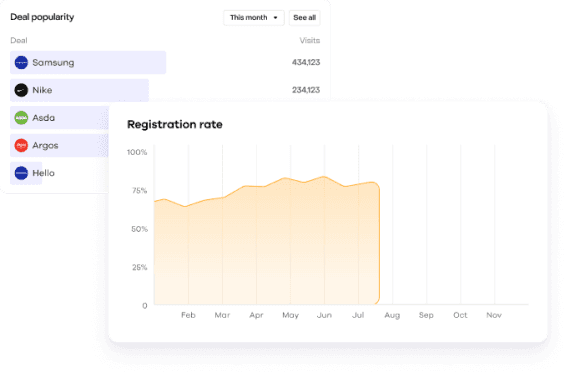Dubbed 'the next big work perk', On-Demand Pay is turbocharging worker benefits. Find out why so many businesses are getting on board with it.
Popular in the US to counter the use of payday loans, On-Demand Pay is a way for workers to receive their pay as they earn it, rather than having to wait for the end of the current payroll cycle.
Because payday loans typically have high interest rates, they often lead people into a spiral of debt. But On-Demand Pay offers workers advanced access to their wages without clocking up any interest, and for just a tiny withdrawal fee (or for free if the business chooses to cover it).
The concept has proven so successful in the US that On-Demand Pay has near 100% adoption in industries like retail and hospitality. And across the workforce, nearly 20% of US workers use On-Demand Pay.
Coming to a workplace near you
On-demand pay (also known as earned wage access, instant payments and flexible pay) is already growing in popularity in the UK. One in 10 UK businesses now offers workers the option to be paid when they choose1.
Why has it caught the attention of businesses? It’s not just because it provides a major benefit for the employee, it’s also because it can improve the performance of the business itself. Here are some of the proven impacts of On-Demand Pay:
Increases shift uptake
Reduces absences
Increases loyalty
Reduces worker churn
Attracts employees
The fascinating thing is how easy it is to implement On-Demand Pay. Here at Onsi, we even provide the funds so you can get started with no significant changes to your cashflow.
Supporting workers with the cost of living
The cost of living crisis has hit retail and hospitality workers especially hard. With soaring rents, sky-high energy costs, and record grocery bills, hourly workers are increasingly living from paycheck to paycheck.
According to a survey by the Money and Pensions Service, one in six workers have no savings at all. This means that should an unexpected expense occur, they would have to borrow funds to cover it.
Our survey of members found that 46%2 would need help to handle a major unplanned expense in the middle of the month. It’s a stressful situation to be in and can have a hugely detrimental effect on worker wellbeing.
On the other hand, On-Demand Pay helps to promote financial wellbeing by allowing workers flexible access to their money so they can budget more easily and avoid debt. Because On-Demand Pay is based on what people have already earned, there are no credit checks and there isn’t any interest to be paid.
Addressing ethical concerns
Good businesses take the welfare of their people seriously. It’s important to look at any potential downside that could come with giving workers instant access to their wages. Some concerns a business might have include people overusing the drawdown facility, or spending all their money and not having enough on payday.
In reality, there’s no evidence to suggest hourly workers who are on the lower end of the pay scale are ‘bad’ with money. On the contrary, people used to operating on a budget are often more mindful of how they spend. However, businesses can cap earnings drawdowns to ensure a percentage remains at the end of the month.
Another worry might be charging workers to access their wages. As we said earlier, businesses do have the option to cover this small fee. But when weighing up the cost of On-Demand Pay, it’s worth considering the charges people incur when they have to rely on overdrafts or credit cards for cash advances. It’s usually a much better option.
Using tiering to incentive workers to earn (and save) more
One of the big benefits of On-Demand Pay for businesses and workers alike is that it incentivises people to take up more shifts. Research shows that 64% of workers are willing to take extra shifts because of it3. As a result, workers earn more money and businesses are more productive. Onsi maximises this benefit by using the platform to gamify the experience.
Businesses can create tiers that give increased rewards as the worker carries out more shifts. For example, someone who has completed one shift is in ‘Tier 3’ and they are allowed to draw down 35% of their pay for a fee of £1.50.
Meanwhile, someone who has carried out 10 shifts is in ‘Tier 2’ and can access 50% of their pay for a reduced drawdown fee of £1. When a worker shows extra commitment and progresses to ‘Tier 3’ (for example by working 50 shifts) they can enjoy 75% of their wages and avoid paying any fees. Not only are they earning more, they have more money available to them and are saving on fees - a win-win.
Why wouldn’t you implement On-Demand Pay?
It’s clear to see the many benefits of giving workers flexible access to their pay, but it can seem like a big step for a business operationally. You might feel that you simply don’t have the capacity, but when you work with a supplier like Onsi, all the hard work is done for you.
Onsi effortlessly integrates with your time and attendance systems to automatically make wages available to workers after every shift (or your desired cadence). You simply plug in your shift data and you’re ready to go, it’s all done automatically. It means you can ditch laborious payroll spreadsheets, actually saving you time.
Don’t forget that Onsi finances the payments to workers until the end of the month, when the businesses pays out the net pay. Because of this, there’s no real impact on the business payroll.
Find out more
If you’re interested in exploring On-Demand Pay for your business, speak to one of our team. They will be happy to go through some top tips for a smooth implementation and help you build a clear communication plan for your workers and stakeholders.




